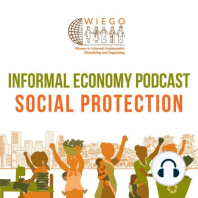18 min listen

#14 Impact of the Global Pandemic on Informal Workers - Covid-19 edition
#14 Impact of the Global Pandemic on Informal Workers - Covid-19 edition
ratings:
Length:
55 minutes
Released:
May 5, 2020
Format:
Podcast episode
Description
In this second episode of the mini-series, we will hear the concrete impact on the lives of informal workers in cities around the world, with brief updates from the ground from WIEGO team members who work closely with informal workers. We also bring the account from two workers leaders themselves, on how the lockdown is affecting their lives and those of their comrades.
I talked to 11 people from 9 cities around the world. From Delhi, India, to Portland, United States, passing through Dakar, Johannesburg, Accra, Belo Horizonte, Bogota, Buenos Aires and Mexico City.
We will hear how local and national governments are responding to the crisis to protect informal workers health and livelihoods, as the cities try to face a global crisis. We will learn how workers are organizing to pressure authorities, but also how some of them are taking direct action to support vulnerable workers through these difficult times.
Guests
-Tania Espinoza – Mexico City Focal City project coordinator
-Carolina Palacio – Buenos Aires Costal City project coordinator
-Federico Parra – Bogotá, regional coordinator
-Taylor Cass Talbott – Portland, Project officer
-Sonia Dias – Belo Horizonte, waste specialist
-Ana Carolina Ogando – Belo Horizonte, research associate
-Lulama Mali – Johannesburg, South Africa Informal Traders Organization
-Dorcas Ansah, Accra Focal City project coordinator
-Anass, Accra, market trader
-Shalini Sinha, Delhi Focal City project coordinator
-Adama, Dakar Focal City project coordinator
*COVID-19 and Informal Workers - Advocacy, Opinion & Action https://www.wiego.org/covid-19-and-informal-workers-advocacy-opinion-action
*Informal Workers Campaigns https://www.wiego.org/support-informal-workers-campaigns
*Informal worker demands during COVID-19 crisis https://www.wiego.org/informal-worker-demands-during-covid-19-crisis
*Government responses to COVID-19 Crisis https://www.wiego.org/government-responses-covid-19-crisis
*Blog: How cities can support informal workers: COVID-19 and beyond, by Jenna Harvey https://www.wiego.org/blog/how-cities-can-support-informal-workers-covid-19-and-beyond
*Blog: Informal workers on the frontlines of COVID-19: Providing critical services without adequate protections and pay, by Jenna Harvey
https://www.wiego.org/blog/informal-workers-frontlines-covid-19-providing-critical-services-without-adequate-protections
* WIEGO Focal Cities page https://www.wiego.org/our-work-impact/focal-cities
*Our theme music is Focus from AA Aalto (Creative Commons)
I talked to 11 people from 9 cities around the world. From Delhi, India, to Portland, United States, passing through Dakar, Johannesburg, Accra, Belo Horizonte, Bogota, Buenos Aires and Mexico City.
We will hear how local and national governments are responding to the crisis to protect informal workers health and livelihoods, as the cities try to face a global crisis. We will learn how workers are organizing to pressure authorities, but also how some of them are taking direct action to support vulnerable workers through these difficult times.
Guests
-Tania Espinoza – Mexico City Focal City project coordinator
-Carolina Palacio – Buenos Aires Costal City project coordinator
-Federico Parra – Bogotá, regional coordinator
-Taylor Cass Talbott – Portland, Project officer
-Sonia Dias – Belo Horizonte, waste specialist
-Ana Carolina Ogando – Belo Horizonte, research associate
-Lulama Mali – Johannesburg, South Africa Informal Traders Organization
-Dorcas Ansah, Accra Focal City project coordinator
-Anass, Accra, market trader
-Shalini Sinha, Delhi Focal City project coordinator
-Adama, Dakar Focal City project coordinator
*COVID-19 and Informal Workers - Advocacy, Opinion & Action https://www.wiego.org/covid-19-and-informal-workers-advocacy-opinion-action
*Informal Workers Campaigns https://www.wiego.org/support-informal-workers-campaigns
*Informal worker demands during COVID-19 crisis https://www.wiego.org/informal-worker-demands-during-covid-19-crisis
*Government responses to COVID-19 Crisis https://www.wiego.org/government-responses-covid-19-crisis
*Blog: How cities can support informal workers: COVID-19 and beyond, by Jenna Harvey https://www.wiego.org/blog/how-cities-can-support-informal-workers-covid-19-and-beyond
*Blog: Informal workers on the frontlines of COVID-19: Providing critical services without adequate protections and pay, by Jenna Harvey
https://www.wiego.org/blog/informal-workers-frontlines-covid-19-providing-critical-services-without-adequate-protections
* WIEGO Focal Cities page https://www.wiego.org/our-work-impact/focal-cities
*Our theme music is Focus from AA Aalto (Creative Commons)
Released:
May 5, 2020
Format:
Podcast episode
Titles in the series (44)
#02 Urban Infrastructure, Social Protection and Women Informal Workers: March is the month when the international women’s… by Informal Economy Podcast: Social Protection